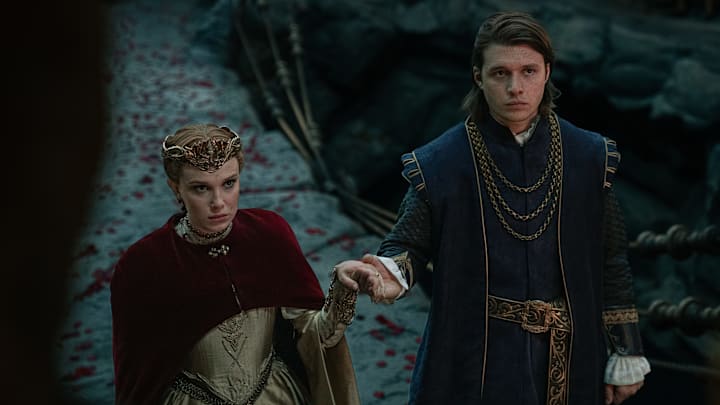Netflix's Damsel relies on the growing popularity surrounding the concept that a woman does not need to wait for a man to come in and save her when she is more than capable of saving herself. The film even warns the audience from the beginning that this is not the type of story where the viewer should expect the Prince to ride in on a white horse and save Elodie from whatever peril she may find herself in.
The film's premise is fairly simple enough to follow, even if there is not a lot of logic portrayed in the execution. Centuries ago, a group of men had come in and murdered a dragon's freshly hatched babies. The dragon, in agony and hatred, killed all but one of the men who murdered her children. In revenge, the dragon decided that the man must give up his own three daughters in exchange for the children she lost, and thus the pattern would continue forever.
What Elodie initially believes to be a mutually beneficial marriage union for the sake of the royal family and giving her own family and people the money they need to flourish, is actually something far darker.
Damsel wants the audience to care about Elodie, as this movie is mostly the story of one person undergoing a massive traumatic experience questioning whether she will escape with her life. However, the Netflix film does not spend any time trying to get the audience to care about the rest of the supporting characters, including Prince Henry, who is only meant to be charming enough to get the audience through the first third of the film, Queen Isabelle, who the film never pretends is anything other than a horrible person, Lady Bayford, one of the only characters in the film who portrays a shred of empathy, Floria, Elodie's younger sister who's only aspect of significance is being a child, and Lord Bayford, Elodie's father who willingly sold her out to die.
Not only does Damsel never pretend to care about these people, but the only thing the movie does well toward them is preparing for the ending, which is ultimately the best part of the entire film. Elodie's journey has her question the truth surrounding the previous women who had been thrown into the caves to die, and the hints they had left behind to help whoever was next hopefully escape the dragon's clutches.
While Damsel tries, it is never quite able to increase the momentum enough to earn itself a spot as a thrilling movie. Instead, most of the film is spent waiting for Elodie to eventually escape the chasm. Rather than encouraging excitement for Elodie's situation, the story grows repetitive, and when the rest of the characters are of no help adding to the story, it only forces the film to fall flat.
The film's ending, which is also the best part of the movie, may make the rest of the story leading up to it worth the wait, as it will make the final moments that much sweeter.
